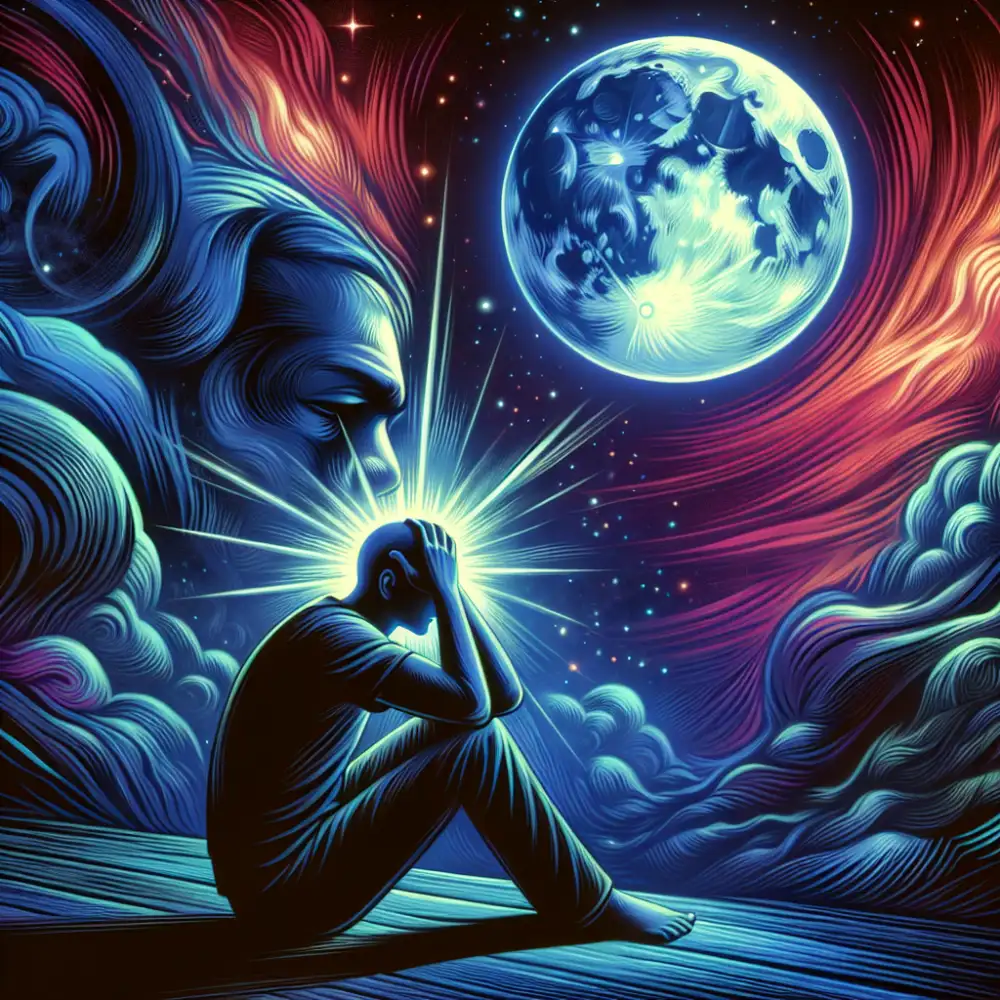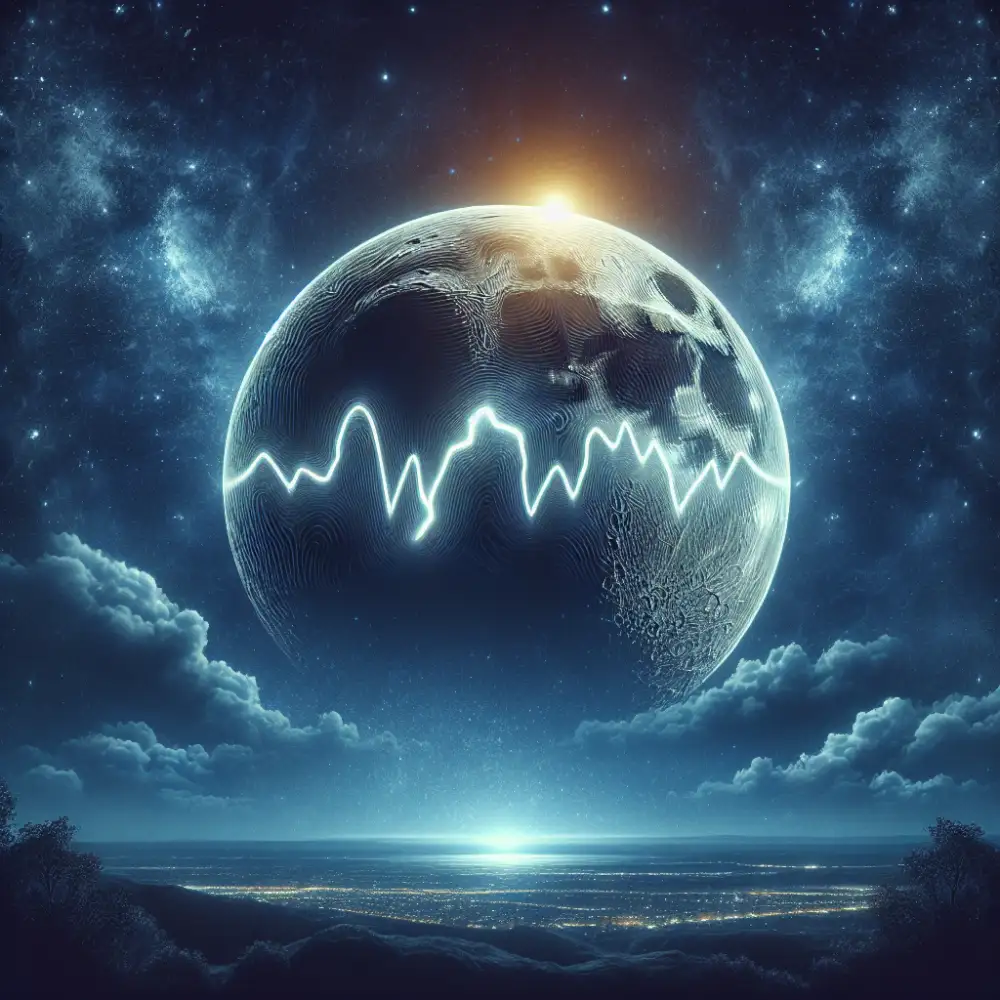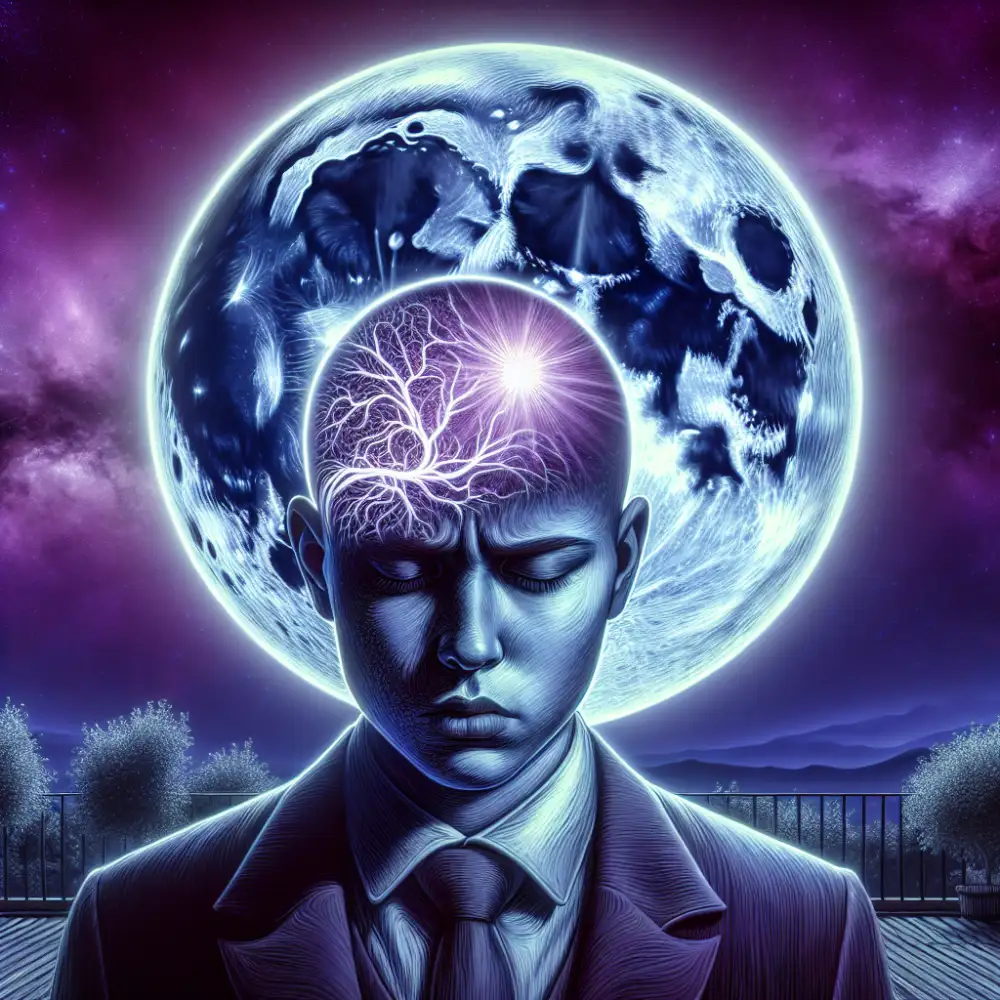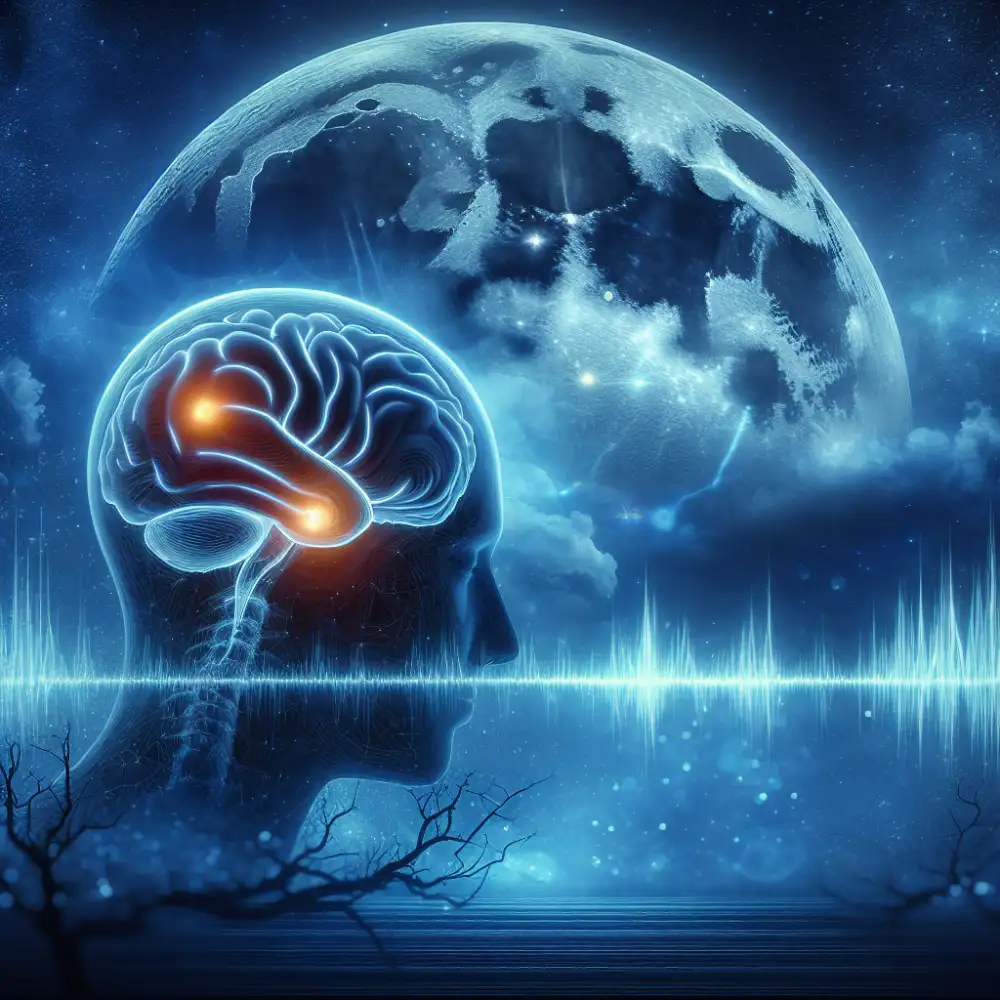Full Moon Migraines: Fact or Fiction?

Full Moon Migraines: Real or Myth?
For centuries, people have attributed a range of strange occurrences to the full moon, from werewolves to increased hospital admissions. Among these beliefs is the idea that the full moon can trigger migraines. Is there any truth to this age-old assumption, or is it just another myth we've inherited from our ancestors?
Migraines are intense, often debilitating headaches that can last for hours or even days. They're frequently accompanied by nausea, vomiting, and sensitivity to light and sound. While the exact causes of migraines are complex and not fully understood, we know they involve a combination of genetic predisposition and environmental triggers. These triggers can vary significantly from person to person, but common culprits include stress, lack of sleep, certain foods, and weather changes.
So, where does the full moon fit into all of this? Some people who experience migraines report an increase in frequency or severity around the time of the full moon. However, scientific studies investigating this link have yielded mixed results. Some studies have found a slight correlation, while others have found no connection at all.
It's important to note that correlation does not equal causation. Even if some individuals experience more migraines around the full moon, this doesn't necessarily mean the moon itself is the cause. Other factors, such as stress levels or sleep patterns, could also be influenced by lunar cycles or simply coincide with them.
More research is needed to determine if there's a genuine connection between the full moon and migraines. If you suspect your migraines might be influenced by the lunar cycle, it's a good idea to track your headaches and the dates of the full moon over several months. This self-observation can provide valuable insights and help you identify any potential patterns.
Understanding Migraines
Migraines are notoriously complex, and while we've made strides in understanding their triggers, some remain elusive. One intriguing area of exploration is the relationship between migraines and the lunar cycle, particularly the full moon. Many migraine sufferers report an increase in migraine frequency or intensity around the full moon. While anecdotal evidence is abundant, scientific research on this connection is somewhat limited and inconclusive.
Some theories suggest that the gravitational pull of the full moon, similar to its influence on tides, might subtly affect fluids in the brain, potentially triggering migraines in susceptible individuals. Others propose that the increased brightness of the full moon could disrupt sleep patterns, a known migraine trigger for many. However, it's crucial to remember that correlation doesn't equal causation.
While some studies have shown a possible link between the full moon and certain headache types, more rigorous research is needed to establish a definitive connection and understand the underlying mechanisms. If you notice your migraines seem worse or more frequent around the full moon, keeping a detailed headache diary that tracks your symptoms, sleep, and menstrual cycle could be helpful. This information can be valuable for you and your doctor to identify potential triggers and tailor your treatment plan.

The Science Behind Full Moons
For centuries, people have associated the full moon with various phenomena, from werewolves to erratic behavior. While most of these claims lack scientific backing, the relationship between the full moon and migraines is a topic of ongoing research. Some studies suggest a possible connection, while others find no correlation.
One theory focuses on the moon's gravitational pull, which affects tides. Since the human body is primarily water, some believe this pull could subtly impact our physiology, potentially triggering migraines in susceptible individuals. However, the gravitational force exerted by the moon on our bodies is relatively weak, and many scientists argue it's unlikely to cause such specific physiological changes.
Another hypothesis revolves around the impact of moonlight on sleep. Full moons are significantly brighter, potentially disrupting sleep patterns and triggering migraines in those sensitive to sleep disturbances. This theory holds more weight, as sleep deprivation is a known migraine trigger. However, more research is needed to establish a definitive link between full moon brightness, sleep disruption, and migraine occurrence.
While the science behind full moons and migraines remains inconclusive, anecdotal evidence persists. Many migraine sufferers report an increase in frequency or intensity around the full moon. If you notice a pattern in your migraines coinciding with the lunar cycle, it's worth discussing with your doctor.
Can Lunar Cycles Trigger Migraines?
For generations, people have whispered about the moon's influence on everything from tides to werewolves. Among these beliefs is the idea that the full moon can trigger migraines. While science hasn't definitively proven this link, anecdotal evidence and some studies suggest a possible connection.
Many migraine sufferers report an increase in headache frequency or intensity around the full moon. Some theories suggest this could be due to the moon's gravitational pull affecting fluids in the body, similar to how it impacts tides. This fluid shift, some believe, could trigger pressure changes in the brain, leading to migraines in susceptible individuals.
However, research on the topic remains inconclusive. Some studies have found a correlation between lunar phases and migraine occurrence, while others haven't. This lack of consensus highlights the complexity of migraines and the many factors that can contribute to them, including stress, hormones, and environmental triggers.

While the jury is still out on the moon's direct impact on migraines, it's essential to pay attention to your body's patterns. If you notice an increase in migraine frequency or severity around a specific time of the month, including the full moon, keeping a headache diary can help you identify potential triggers. This information can be valuable when discussing your migraine management plan with your doctor.
The full moon hangs heavy, a celestial mirror reflecting the turmoil within my skull.
Elara Nightshade
Existing Research and Studies
While many people believe that the full moon can trigger migraines, scientific research on this topic is limited and has yielded mixed results. Some studies have found a correlation between the lunar cycle and migraine occurrence, while others have not.
A study published in the journal "Headache" in 2013 analyzed data from 770 migraine patients over a period of three years. The researchers found a small but statistically significant increase in the frequency of migraines in the days leading up to the full moon. However, the study did not find a link between the full moon and the severity of migraines.
Another study, published in the journal "Cephalalgia" in 2004, examined the relationship between the lunar cycle and headache diaries kept by 114 patients over a period of six months. The researchers found no significant association between the phases of the moon and the occurrence of headaches.
It is important to note that these studies have limitations. They typically rely on self-reported data from patients, which can be subjective and unreliable. Additionally, the studies often have small sample sizes and may not be representative of the general population.
More research is needed to fully understand the potential link between the full moon and migraines. Future studies should use larger sample sizes, objective measures of migraine occurrence, and control for other factors that could influence migraine frequency, such as stress, sleep patterns, and weather changes.
Factors Influencing Migraines
Many people who experience migraines report an increase in frequency or intensity around the time of the full moon. While anecdotal evidence is abundant, scientific research on the relationship between the full moon and migraines remains inconclusive. Some studies have suggested a possible correlation, while others have found no significant link.
Several factors could contribute to the perception of full moon migraines. One theory involves the moon's gravitational pull, which affects tides. However, the gravitational effect on the human body is minimal and unlikely to directly trigger migraines. Another possibility is the influence of light. The full moon is significantly brighter than other moon phases, and increased light exposure can trigger migraines in some individuals.


Additionally, sleep disruption might play a role. The brighter light from the full moon could interfere with sleep patterns, and sleep deprivation is a known migraine trigger. It's also important to consider the role of psychological factors. If someone believes the full moon affects their migraines, they may be more likely to notice and attribute headaches during this time to the lunar cycle, even if there's no direct connection.
More research is needed to understand the complex relationship between the full moon and migraines. If you notice a pattern of increased migraine frequency or severity around the full moon, it's essential to consult a healthcare professional to rule out other potential triggers and discuss appropriate management strategies.
Tracking Your Migraines
Many migraine sufferers report an increase in migraine frequency around the full moon. While scientific evidence to support this link is limited, anecdotal evidence suggests a potential connection. If you suspect your migraines might be influenced by the lunar cycle, tracking your headaches could provide valuable insights.
Start by noting down the date and time each migraine begins and ends. Also, track the severity of your migraine using a scale (for example, 1-10) and any accompanying symptoms. Alongside your migraine diary, maintain a separate lunar calendar. You can easily find lunar calendars online or through various apps. By comparing your migraine patterns with the lunar phases, you might notice a trend.
Remember, this method is subjective and doesn't replace professional medical advice. If you're experiencing frequent or severe migraines, consult a healthcare professional for proper diagnosis and treatment.
Tips for Migraine Relief
While there's no definitive scientific proof linking full moons to migraines, many people report an increase in migraine frequency and severity around this lunar phase. If you're among those who suspect a connection, here are some tips to find relief:
| Feature | Full Moon Migraines | Regular Migraines |
|---|---|---|
| Timing | Around the full moon phase | Any time |
| Possible Triggers | May be influenced by hormonal shifts or other lunar cycle-related factors | Stress, diet, weather changes, hormonal fluctuations, sensory stimuli, sleep disturbances, and more. |
| Symptoms | Typically the same as regular migraines (throbbing pain, nausea, sensitivity to light and sound) | Throbbing pain, nausea, sensitivity to light and sound, aura (visual disturbances) |
| Scientific Evidence | Limited and inconclusive | Well-established |
Track Your Triggers: Keep a detailed migraine diary, noting the date and time of each episode, along with any potential triggers like stress, sleep, diet, and, yes, the moon phase. Over time, you may notice a pattern.

Prioritize Sleep Hygiene: Aim for 7-9 hours of quality sleep each night, especially in the days leading up to and following a full moon. A consistent sleep schedule can help regulate your body's natural rhythms.
Stay Hydrated: Dehydration can be a migraine trigger, so drink plenty of water throughout the day, particularly during a full moon when you might be more susceptible.
Manage Stress: Stress is a well-known migraine trigger. Explore relaxation techniques like deep breathing exercises, meditation, or yoga to manage stress levels, especially around the full moon.
Consider Dietary Changes: Pay attention to your diet and identify any potential food triggers that might worsen your migraines. Common culprits include aged cheese, processed meats, and alcohol.
Consult Your Doctor: If your migraines are severe or interfere with your daily life, don't hesitate to seek professional help. Your doctor can help identify potential underlying causes and recommend appropriate treatment options.
Consulting a Healthcare Professional
If you suspect your migraines might be linked to the lunar cycle, don't hesitate to consult a healthcare professional. While research on the connection between the full moon and migraines is inconclusive, your doctor can help you identify potential triggers and develop a personalized treatment plan. They may ask you to keep a headache diary to track your migraine episodes, sleep patterns, and menstrual cycle, if applicable. This information can help determine if there's a correlation between your headaches and the lunar cycle or other factors. Remember, self-treating can be risky, and it's essential to seek professional medical advice for managing your migraines effectively.
Published: 28. 06. 2024
Category: Health



